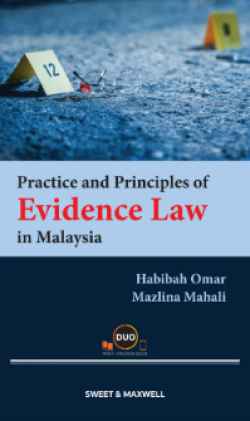
GET UP TO 15% DISCOUNT!
Sign up now as a CBS member & enjoy our royal discounts!

Practice and Principles of Evidence Law in Malaysia
- Publication Date : Nov - 2023
- Author : Habibah Omar & Mazlina Mahali
- ISBN : 9786297527376
- Format : Hardcover + eBook
- Country : Malaysia
Practice and Principles of Evidence Law in Malaysia comprehensively provide the core principles of the law of evidence as practiced in Malaysia. The book explains the law thoroughly, supported by current legislation and the latest cases, in an engaging and systematic manner. The sophistication of the concepts, principles, and application of the law are presented in 15 chapters that are well-structured for every lawyer’s good understanding of the subject.
The text focuses on general relevancy, similar fact evidence, admission and confession, hearsay, opinion, character evidence, judicial notice, and documentary evidence. The text explores issues in relation to witnesses, including competency, compellability and privilege, corroboration, and the production and examination of witnesses. Issues of presumption and estoppel, as well as burden and standard of proof, are given thorough analysis. This book extensively discusses documentary evidence, especially the authenticity of various kinds of digital evidence. Up-to-date discussion on the amendments to the Evidence of Child Witness Act 2007 and the Sexual Offences Against Children Act 2017 reflects the current standing and challenges of evidence of a child witness.
Practice and Principles of Evidence Law in Malaysia is a comprehensive reference for a good appreciation of the fundamental elements of evidence law in Malaysia. It is an up-to-date and valuable resource of evidence law not only for lawyers but also for judges, judicial officers, and every legal professional in the practice.
Key Features
- Explains the current position of evidence law in Malaysia coherently and systematically
- Extensive updates on case law, up to July 2023
- Summaries of essential concepts provide a practical understanding of complicated principles
- Comprehensive analysis of documentary evidence
- Explores the current standing and challenges of a child witness, discussing the 2023 amendments to the Evidence of Child Witness Act 2007 and the Sexual Offences Against Children Act 2017
- Regular citations of local and foreign case authorities to assist understanding of the application of the provisions of the Evidence Act 1950
- Presents the development of the law through local court decisions while explaining the common law application in Malaysia
Table of Contents
1. Introduction to Evidence Law
2. General Relevancy
3. Similar Fact Evidence
4. Admissions and Confession
5. Hearsay Evidence
6. Opinion Evidence
7. Character Evidence
8. Judicial Notice
9. Documentary Evidence
10. Competency, Compellability and Privilege
11. Corroboration
12. Production and Examination of Witnesses
13. Presumption
14. Estoppel
15. Burden and Standard of Proof
Practice and Principles of Evidence Law in Malaysia
Practice and Principles of Evidence Law in Malaysia comprehensively provide the core principles of the law of evidence as practiced in Malaysia. The book explains the law thoroughly, supported by current legislation and the latest cases, in an engaging and systematic manner. The sophistication of the concepts, principles, and application of the law are presented in 15 chapters that are well-structured for every lawyer’s good understanding of the subject.
The text focuses on general relevancy, similar fact evidence, admission and confession, hearsay, opinion, character evidence, judicial notice, and documentary evidence. The text explores issues in relation to witnesses, including competency, compellability and privilege, corroboration, and the production and examination of witnesses. Issues of presumption and estoppel, as well as burden and standard of proof, are given thorough analysis. This book extensively discusses documentary evidence, especially the authenticity of various kinds of digital evidence. Up-to-date discussion on the amendments to the Evidence of Child Witness Act 2007 and the Sexual Offences Against Children Act 2017 reflects the current standing and challenges of evidence of a child witness.
Practice and Principles of Evidence Law in Malaysia is a comprehensive reference for a good appreciation of the fundamental elements of evidence law in Malaysia. It is an up-to-date and valuable resource of evidence law not only for lawyers but also for judges, judicial officers, and every legal professional in the practice.
Key Features
- Explains the current position of evidence law in Malaysia coherently and systematically
- Extensive updates on case law, up to July 2023
- Summaries of essential concepts provide a practical understanding of complicated principles
- Comprehensive analysis of documentary evidence
- Explores the current standing and challenges of a child witness, discussing the 2023 amendments to the Evidence of Child Witness Act 2007 and the Sexual Offences Against Children Act 2017
- Regular citations of local and foreign case authorities to assist understanding of the application of the provisions of the Evidence Act 1950
- Presents the development of the law through local court decisions while explaining the common law application in Malaysia
Table of Contents
1. Introduction to Evidence Law
2. General Relevancy
3. Similar Fact Evidence
4. Admissions and Confession
5. Hearsay Evidence
6. Opinion Evidence
7. Character Evidence
8. Judicial Notice
9. Documentary Evidence
10. Competency, Compellability and Privilege
11. Corroboration
12. Production and Examination of Witnesses
13. Presumption
14. Estoppel
15. Burden and Standard of Proof
GET UP TO 15% DISCOUNT!
Sign up now as a CBS member & enjoy our royal discounts!

